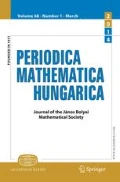Abstract
For F ∈ Z [ X], let &PSgr; F (x, y) denote the number of positive integers n not exceeding x such that F(n) is free of prime factors > y. Our main purpose is to obtain lower bounds of the form &PSgr; (x, y) >> x for arbitrary F and for y equal to a suitable power of x. Our proofs rest on some results and methods of two articles by the third author concerning localization of divisors of polynomial values. Analogous results for the polynomial values at prime arguments are also obtained.
Similar content being viewed by others
REFERENCES
A. Balog and I. Z. Ruzsa, On an additive property of stable sets, Sieve Methods, Exponential Sums and Their Applications in Number Theory (Cardiff, 1995), Cambridge Univ. Press, New York, 1997, pp. 55–63.
A. Balog and T. D. Wooley, On strings of consecutive integers with no large prime factors, J. Austral. Math. Soc. Ser. A 64 (1998), no. 2, 266–276.
A. A. Buchstab, On those numbers in an arithmetic progression all prime factors of which are small in magnitude, Dokl. Akad. Nauk SSSR 67 (1949), 5–8.
C. Dartyge, Entiers de la forme n 2 + 1 sans grand facteur premier, Acta Math. Hungar. 72 (1996), 1–34.
R. B. Eggleton and J. L. Selfridge, Consecutive integers with no large prime factors, J. Austral. Math. Soc. Ser. A 22 (1976), no. 1, 1–11.
H. Halberstam and H.-E. Richert, Sieve Methods, Academic Press, London, New York, San Francisco, 1974.
J. B. Friedlander, Shifted primes without large prime factors, Number theory and applications (Banff, AB, 1988), NATO Adv. Sci. Inst. Ser. C Math. Phys. Sci., vol. 265, Kluwer Acad. Publ., Dordrecht, 1989, pp. 393–401.
A. Hildebrand, On a conjecture of Balog, Proc. Amer. Math. Soc. 95 (1985), no. 4, 517–523.
A. Hildebrand, On integer sets containing strings of consecutive integers, Mathematika 36 (1989), no. 1, 60–70.
A. Hildebrand and G. Tenenbaum, Integers without large prime factors, J. Théor. Nombres Bordeaux 5 (1993), 411–484.
N. A. Hmyrova, On polynomials with small prime divisors, Dokl. Akad. Nauk SSSR 155 (1964), 1268–1271.
N. A. Hmyrova, On polynomials with small prime divisors II, Izv. Akad. Nauk SSSR Ser. Mat. 30 (1966), 1367–1372.
M. Nair and G. Tenenbaum, Short sums of certain arithmetic functions, Acta Math. 180, (1998), 119–144.
A. Schinzel, On two theorems of Gelfond and some of their applications, Acta Arith. 13 (1967/1968), 177–236.
G. Tenenbaum, Sur une question d'Erdős et Schinzel, in: A. Baker, B. Bollobás, A. Hajnal (eds.) A Tribute to Paul Erdős, Cambridge University Press (1990), 405–443.
G. Tenenbaum, Sur une question d'Erdős et Schinzel, II, Inventiones Math. 99 (1990), 215–224.
N. M. Timofeev, Polynomials with small prime divisors, Taškent. Gos. Univ. Naučn. Trudy (1977), no. 548 Voprosy Mat., 87–91, 145.
Author information
Authors and Affiliations
Rights and permissions
About this article
Cite this article
Dartyge, C., Tenenbaum, G. & Martin, G. Polynomial values free of large prime factors. Periodica Mathematica Hungarica 43, 111–119 (2002). https://doi.org/10.1023/A:1015237700066
Issue Date:
DOI: https://doi.org/10.1023/A:1015237700066



